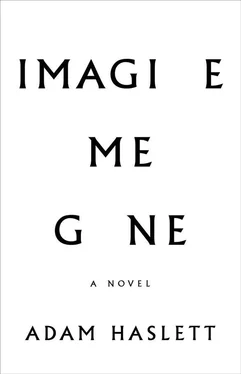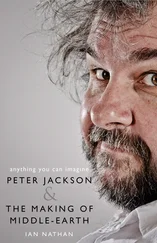“And so that makes what I do illegitimate?”
“Not illegitimate. It’s just part of the context. Not many black women report on politics for national magazines.”
“Oh, come on. Is that really where we still are? Isn’t that what you called ‘bureaucratic multiculturalism’? Checking the box with a colored face?”
“That’s a danger, sure. But maybe what’s more telling is how you take the suggestion that the world isn’t a pure meritocracy. Like it’s an insult to your accomplishment.”
“And it isn’t?”
“Well. If it’s an insult, think what that means: all the qualified people just happen to be upper middle class and white. That’s a three-hundred-year coincidence.”
“I’m asking you about the work I do, and you’re giving me a lecture on affirmative action?”
His impassive eyes gave him the look of an ideologue trying not to sacrifice principle for sentiment.
“I read your piece,” he said. “It was well done.”
Maybe because I was tired, or because it had been so long since he’d offered me any praise, even this reluctant snippet caused my self-pity to well up in its warm, depressive sweetness. I worked as hard as I did, for so little pay, on articles and mini-articles and web teasers that passed into the ether almost as soon as they were published, ignored in favor of the cable-news bloviators, and yet still it turned out I was too privileged and establishment to satisfy my brother’s politics.
“Thanks,” I said, signaling the waiter for the check. “I’m glad you liked it.”
Back at the apartment, he helped me assemble his futon, and we opened the boxes with the sheets our mother had packed, along with the pillows and blankets. He made up the bed while I put away the plates and bowls, and rinsed off the silverware. Then we unpacked his suitcases and set up his closet. I wished we could play music, something to make the rooms a little familiar before I left, but he had forgotten his speaker cables, so we worked to the sound of the fan in the window.
By the time we’d sorted all his belongings except the books and records, it was nearly eleven. I had an early flight from Detroit, and it would take us an hour and a half to get to the airport in the morning. I had booked myself a motel, and I drove us there in the Grand Am, along the empty streets, wanting more than anything for him to say something funny as we passed the gas stations and the darkened malls, something absurd to lighten the moment and release us both.
In the parking lot, as I handed him the car key, it struck me that I should have booked us both at the motel, so he wouldn’t have to sleep in that apartment with no air-conditioning on his own. But it was late. It would take time for him to go back and get his pills, and I was exhausted.
I’d imagined it like the reading group with Caleigh and Myra: the camaraderie of a devotion to radical scholarship, an interrogation of the historical determinants of affect in black life, and perhaps some volunteers for the reparations movement. But to my shock it turned out that most of my fellow grad students subscribed to cable, went to the gym, and weren’t certain yet what interested them enough to write about. It’s not that they objected to my work, or didn’t want to hear about transgenerational haunting, but it didn’t move them. It was my thing, which was fine by them, though not a cause for urgency. Doubtless I came across as something of an odd quantity, being the only white man in the program and older than the junior faculty. Which isn’t to say anyone behaved in an unfriendly manner, just that if there was a potluck, I didn’t hear about it. No matter, I told myself, you’re here to do your work.
That might have been enough, if I’d been able to consume books and articles as fast as I had those many years ago during the first reprieve of Klonopin. But pages of text appeared waxed to me now, covered in a film of distraction. By noon I’d have only a paltry set of notes, and acid in my stomach at the horror of all that remained unread. I kept putting off the duller course work to try to do my own, only to fall behind on both. In the evenings, on the phone, Caleigh tried to convince me things would improve, that I simply needed to adjust, while Mom suggested I would sleep better if I turned down the heat.
It hadn’t occurred to me that living on my own would be different from living with Ben and Christine. I’d come to dread Ben reminding me IT’S THURSDAY, the day I spent in fear of forgetting to take out the garbage or properly clean the bathroom (I might use the wrong detergent and ruin the tile; I might miss a patch of mold and reap a silent resentment). There was none of that on my own now at Spartan Village. I took the trash out when so moved. Yet no one was in the other room watching 24, eating slow-cooked legumes. No one affectionately mocked my frozen-enchilada dinners, as Christine had for years. I hadn’t realized that her laughter was what made them honorable. I had lived most of my adult life with Ben, and later with him and Christine together, without noticing I was doing it, and yet I had never suspected that hearing the muffled edge of their conversations through closed doors and the toilet flushing upstairs had done so much to assure me that other people existed. In the new apartment the cinder-block walls cut off all sound of the neighbors.
Occasionally, on the walkway, I’d chat with the portly medical resident from next door, a soft-skinned, childlike man from Delaware who was doing a rotation at a pain clinic and complaining of having to treat nothing but refractory patients. Like the woman who’d gone to visit relatives in Chicago after her third spinal surgery only to be run down in the aisle of a Costco in a shopping-rage incident, requiring him, against his better judgment, to FedEx her a prescription for fentanyl patches, which she’d applied all in one go, causing her to miss the Detroit stop on her bus home, and sleep through to Toronto. They’re dumpster cases, he said, other services don’t want to deal with them, so they turf them over to us. Leading me, naturally, to wonder what kind of supplies he might keep in his own apartment.
As is the way of things, I was forced to take more Klonopin to get through the days. Dr. Bennet had written me for a decent supply to tide me over during the transition, but I’d run through it in a jiffy. Then I went through the batch that Dr. Greenman, my new shrink at the University Department of Mental Hygiene, had prescribed before a month had passed. The first time, she obliged me with an early refill, and she did it again a few weeks later, as any humanitarian would. But after my third request she began exhibiting signs of moralism, suggesting I needed to be more disciplined.
By then, the sweating had commenced. Night sweats were one thing. I was used to waking in soaked sheets; bedding could be laundered and the day needn’t be lost. But sweating through my shirt before making it to the bus stop was a real drag. The temperature had nothing to do with it. Wind could be blasting off the steppes of Michigan and still my pores ran like broken faucets, my skin as slick as a clapped donkey in July. In seminar, I hesitated to raise my hand lest the stench of my underarm waft across the table. But I’d waited a long time to get here and I wanted to contribute, so I started bringing a washcloth and an extra set of clothes with me onto campus each day, to towel off and change before class.
The program was affiliated with a mentoring scheme for minority high schoolers, and with Caleigh’s encouragement, I signed up to volunteer two afternoons a week. They paired me with a sophomore named Jaylen. Our first task was to work through a review book for the state English test. But after ten minutes muddling through a Marge Piercy poem, I commented on his Juicy J T-shirt, and we got sidetracked on a discussion of the Memphis origins of crunk. I concurred in his judgment that Three 6 Mafia’s “It’s Hard Out Here for a Pimp” was a mainstreamed train wreck by an otherwise innovative crew, and that Juicy J himself bore much of the responsibility, given his brand-expansion ambitions. This was around the time that Oris Jay (aka Darqwan) finally got around to releasing another Sheffield bass record on his homegrown Texture label, and I suggested that if Jaylen really wanted to give his thorax a shake he check out some British dubstep. Which I’m happy to say he did. By our third meeting it was clear I had more in common with him than I did with my fellow grad students. For one thing, we were both fifteen (at the level of the psychic), we listened to inordinate quantities of dance music, and as far as I could tell, we were both attracted to his English teacher.
Читать дальше












